List of UK Singles Chart number ones of the 1970s
The UK Singles Chart is the official record chart in the United Kingdom. In the 1970s, it was compiled weekly by the British Market Research Bureau (BMRB) on behalf of the British record industry with a one-week break each Christmas.[1] Prior to 1969 many music papers compiled their own sales charts but, on 15 February 1969, the BMRB was commissioned in a joint venture by the BBC and Record Retailer to compile the chart. BMRB compiled the first chart from postal returns of sales logs from 250 record shops.[2] The sampling cost approximately £52,000 and shops were randomly chosen and submitted figures for sales taken up to the close of trade on Saturday. The data was compiled on Monday and given to the BBC on Tuesday to be announced on Johnnie Walker's afternoon show and later published in Record Retailer (rebranded Music Week in 1972).[1] However, the BMRB often struggled to have the full sample of sales figures returned by post. The 1971 postal strike meant that data had to be collected by telephone but this was deemed inadequate for a national chart, and by 1973 the BMRB was using motorcycle couriers to collect sales figures.[1]
| UK Singles Chart number ones |
|---|
|
Other charts |
| UK Singles Chart Official Charts Company Christmas number one |
In terms of number-one singles, ABBA were the most successful group of the decade having seven singles reach the top spot. The longest duration of a single at number-one was nine weeks and this was achieved on three occasions: "Bohemian Rhapsody" by Queen in 1975; "Mull of Kintyre" / "Girls' School" by Wings in 1977 and "You're the One That I Want" by John Travolta and Olivia Newton-John in 1978. Thirteen records were released that sold over one-million copies within the decade and "Mull of Kintyre" also became the first ever single to sell over two-million copies. In doing so it became the best-ever selling single beating the benchmark set by The Beatles' song "She Loves You" in 1963.[3] "Mull of Kintyre" was also the biggest selling song of the decade and was not surpassed in physical sales until 1984 when Band Aid released "Do They Know It's Christmas?" (which also featured McCartney).[4]
In 1973, the British Phonographic Industry (BPI) was formed and they began certifying the sales of records at certain thresholds: "silver" (250,000 units), "gold" (500,000 units), and "platinum" (1,000,000 units).[5][nb 1] In 1977, the BPI held an awards ceremony at Wembley Conference Centre to mark the Silver Jubilee of Elizabeth II. The event cost £25,000, honoured music from the last 25 years and is considered to be the first BRIT Awards ceremony.[6][7]
Number-one singles

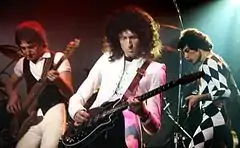
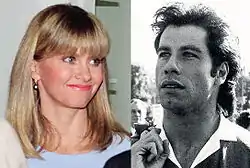
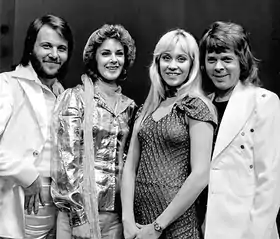

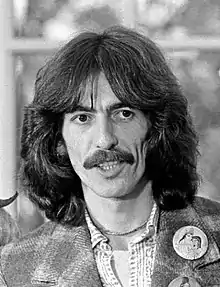
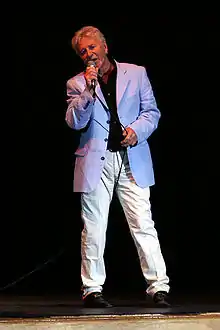
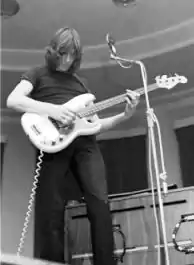
| † | Best-selling single of the year[8] |
|---|---|
| ‡ | Best-selling single of the decade[8] |
| Contents |
|---|
^A long debate has persisted that the Sex Pistols out-sold Sir Rod Stewart's double A-side (a budget single) in June 1977, with their anti-Monarchy anthem "God Save the Queen", during the week of Queen Elizabeth II's Silver Jubilee. On the official UK Singles Chart used by the BBC, it was placed at no. 2, and was banned by the national broadcaster and the Independent Broadcasting Authority, which regulated Independent Local Radio, as it was felt that it might cause offence.[20][21][22] In more recent years, however, the BBC have tacitly admitted that the song did indeed reach the top of the chart,[23] although this has never been definitively confirmed, with the BBC and sources close to Virgin Records' owner Richard Branson both confirming and denying it as fact.
| Contents |
|---|
By artist
The following artists achieved three or more number-one hits during the 1970s. Swedish group, ABBA, were the most successful artist of the decade in terms of number-one singles. They had seven number-ones: "Waterloo" (1974); "Mamma Mia", "Fernando" and "Dancing Queen" (all 1976); "Knowing Me, Knowing You", "The Name of the Game" (both 1977); and "Take a Chance on Me" (1978).
| Artist | Number ones | Weeks at number one |
|---|---|---|
| ABBA | 7 | 26 |
| Slade | 6 | 20 |
| Rod Stewart | 5 | 15 |
| T. Rex | 4 | 16 |
| Donny Osmond | 3 | 10 |
| Mud | 3 | 10 |
| Gary Glitter | 3 | 9 |
| Brotherhood of Man | 3 | 8 |
| 10cc | 3 | 4 |
By record label
The following record labels had five or more number ones on the UK Singles Chart during the 1970s.
| Record label | Number ones |
|---|---|
| Bell | 13 |
| CBS | 12 |
| Polydor | 11 |
| RCA | 10 |
| Pye | 9 |
| Epic | 9 |
| EMI | 8 |
| RAK | 6 |
| MGM | 5 |
Million-selling and platinum records
In April 1973, the British Phonographic Industry began classifying singles and albums by the number of units sold. The highest threshold is "platinum record" and was then awarded to singles that sold over 1,000,000 units.[5][nb 1] Thirteen records were classified platinum in the 1970s and two number-one songs from the 1970s were classified as platinum in the subsequent decade.[26] Slade's "Merry Xmas Everybody" subsequently sold over one-million copies but in 1985, after sales from its re-release were included.[27][28]
Two other songs originally released in the 1970s became platinum and become million selling records but both were number-ones in a subsequent decade after being re-released: "Imagine" by John Lennon charted at number six in 1975 but reached number one in 1981 following Lennon's death at the end of the previous year and Tony Christie's "(Is This The Way To) Amarillo" reached number eighteen in 1971 but later took top spot after being re-released as a charity single in 2005. Five number-ones – ABBA's "Dancing Queen", Ian Dury and The Blockheads' "Hit Me with Your Rhythm Stick", The New Seekers' "I'd Like to Teach the World to Sing (In Perfect Harmony)", Julie Covington's "Don't Cry for Me Argentina" and Pink Floyd's "Another Brick in the Wall (Part II)" – passed the million-sales mark following the introduction of music downloads in 2004.[29][30][31][32][33][34]
| Artist | Song | Date released | Date certified platinum |
Year of millionth sale |
|---|---|---|---|---|
| Gary Glitter | "I Love You Love Me Love" | 9 November 1973 | 1 January 1974 | 1973 |
| Brotherhood of Man | "Save Your Kisses for Me" | 5 March 1976 | 1 May 1976 | 1976 |
| Queen | "Bohemian Rhapsody" | 31 October 1975 | 1 January 1976 | 1975 |
| Wings | "Mull of Kintyre" | 11 November 1977 | 1 December 1977 | 1977 |
| David Soul | "Don't Give Up on Us" | 3 December 1976 | 1 February 1977 | 1977 |
| Boney M. | "Rivers of Babylon" / "Brown Girl in the Ring" | 14 April 1978 | 1 May 1978 | 1978 |
| Boney M. | "Mary's Boy Child – Oh My Lord" | 24 November 1978 | 1 December 1978 | 1978 |
| Simon Park | "Eye Level" | 3 November 1972 | 1 January 1978 | 1977 |
| John Travolta and Olivia Newton-John | "You're the One That I Want" | 1 May 1978 | 1 July 1978 | 1978 |
| John Travolta and Olivia Newton-John | "Summer Nights" | 1 September 1978 | 1 October 1978 | 1978 |
| Village People | "Y.M.C.A." | 1 November 1978 | 1 January 1979 | 1979 |
| Blondie | "Heart of Glass | 19 January 1979 | 1 February 1979 | 1979 |
| Art Garfunkel | "Bright Eyes" | 9 January 1979 | 1 May 1979 | 1979 |
| Pink Floyd | "Another Brick in the Wall (Part II)" | 23 November 1979 | 1 January 1980 | 2004–10 |
| Slade | "Merry Xmas Everybody" | 7 December 1973 | 1 December 1980 | 1985 |
| The New Seekers | "I'd Like to Teach the World to Sing (In Perfect Harmony)" | 11 December 1971[35] | — | 2004–10 |
| ABBA | "Dancing Queen" | 6 August 1976 | — | 2004–10 |
| Julie Covington | "Don't Cry for Me Argentina" | 12 November 1976 | — | 2004–10 |
| Ian Dury and The Blockheads | "Hit Me with Your Rhythm Stick" | 1 November 1978 | — | 2004–10 |
Songs with the most weeks at number one
The following songs spent at least six weeks at number one during the 1970s.
| Artist | Song | Weeks at number one |
|---|---|---|
| Queen | "Bohemian Rhapsody" | 9 |
| Wings | "Mull of Kintyre" / "Girls' School' | |
| Olivia Newton-John and John Travolta | "You're the One That I Want" | |
| Mungo Jerry | "In the Summertime" | 7 |
| Olivia Newton-John and John Travolta | "Summer Nights" | |
| Elvis Presley | "The Wonder of You" | 6 |
| Freda Payne | "Band of Gold" | |
| Dave Edmunds | "I Hear You Knocking | |
| T. Rex | "Hot Love" | |
| Bay City Rollers | "Bye Bye Baby" | |
| Brotherhood of Man | "Save Your Kisses for Me" | |
| Elton John and Kiki Dee | "Don't Go Breaking My Heart" | |
| ABBA | "Dancing Queen" | |
| Art Garfunkel | "Bright Eyes" |
Notes
- The number of sales required to qualify for platinum, gold and silver records was dropped in 1989 to the current thresholds of 200,000 units for a silver record, 400,000 units for a gold record and 600,000 units for a platinum record.[5][24][25]
- The artist, song name, date of number one and its consecutive duration are those given by The Official Charts Company.[9][10][11][12][13][14][15][16][17][18]
- The record labels are those given by the OCC.[19]
References
- Smith, Alan. "50s & 60s UK Charts – The Truth!". Dave McAleer's website. Archived from the original on 3 September 2011. Retrieved 4 November 2010.
- "Key Dates in the History of the Official UK Charts". The Official Charts Company. Archived from the original on 10 January 2008. Retrieved 16 May 2010.
- Leadbetter, Russell (17 May 2010). "Macca proves he's no sellout". The Herald. Retrieved 31 May 2010.
- Westbrook, Caroline (14 January 2005). "The history of the chart-topper". BBC News. Retrieved 31 May 2010.
- Gallup (4 February 1989). "The Top of the Pops Chart" (PDF). Record Mirror: 4. Retrieved 16 July 2010.
- "BRIT Awards". British Phonographic Industry. Retrieved 7 June 2010.
- "The BRITs 1977". BRIT Awards. Retrieved 12 June 2010.
- "Chart Archive – 1970s Singles". everyHit.com. Retrieved 29 July 2010.
- "All the Number One Singles: 1970". The Official Charts Company. Archived from the original on 17 February 2011. Retrieved 13 June 2010.
- "All the Number One Singles: 1971". The Official Charts Company. Archived from the original on 13 January 2011. Retrieved 13 June 2010.
- "All the Number One Singles: 1972". The Official Charts Company. Archived from the original on 5 July 2010. Retrieved 13 June 2010.
- "All the Number One Singles: 1973". The Official Charts Company. Archived from the original on 15 June 2011. Retrieved 13 June 2010.
- "All the Number One Singles: 1974". The Official Charts Company. Archived from the original on 15 June 2011. Retrieved 13 June 2010.
- "All the Number One Singles: 1975". The Official Charts Company. Archived from the original on 15 June 2011. Retrieved 13 June 2010.
- "All the Number One Singles: 1976". The Official Charts Company. Archived from the original on 15 June 2011. Retrieved 13 June 2010.
- "All the Number One Singles: 1977". The Official Charts Company. Archived from the original on 15 June 2011. Retrieved 13 June 2010.
- "All the Number One Singles: 1978". The Official Charts Company. Archived from the original on 15 June 2011. Retrieved 13 June 2010.
- "All the Number One Singles: 1979". The Official Charts Company. Archived from the original on 15 June 2011. Retrieved 13 June 2010.
- "Artist Chart History". London: Official Charts Company. 2010. Archived from the original on 3 September 2011. Retrieved 6 August 2011.
- "Bragg attacks Pistols' royal views". BBC. 27 May 2002. Retrieved 17 July 2013.
- "God Save the Queen: The Sex Pistols take on charity track". ITV News. 19 April 2012. Retrieved 1 January 2018.
- Hall, James (27 May 2017). "God Save the Queen at 40: how the Sex Pistols made the most controversial song in history". The Telegraph. ISSN 0307-1235. Retrieved 1 January 2018.
- "Sex Pistols cover tops chart". BBC News. 14 March 2001. Retrieved 1 January 2018.
- "Certified Awards". British Phonographic Industry. Retrieved 7 June 2010.
- "International Certification Award levels" (PDF). International Federation of the Phonographic Industry. March 2010. p. 7. Archived from the original (PDF) on 26 July 2011. Retrieved 7 June 2010.
- "Certified Awards Search". British Phonographic Industry. Archived from the original on 26 August 2011. Retrieved 7 June 2010.
Customise search with the following settings – Search by: "Keyword", By Award: "Platinum", By Format: "Single" – then search by each individual year. - "Million-Selling Singles". everyHit. Retrieved 12 June 2010.
- "Stats and Facts: Million Sellers". The Official Charts Company. Archived from the original on 16 April 2008. Retrieved 19 July 2010.
- "Digital generation pushes the oldies into the million-sellers club". Music Week. 6 September 2010.
- Jones, Alan (1 June 2010). "Pendulum and Black Eyed Peas make historic week for sales charts". Music Week.
- "New Seekers". Chart Watch. 8 March 2004. Archived from the original on 17 March 2004. Retrieved 13 November 2010.
- "Julie Covington". Chart Watch. 8 March 2004. Archived from the original on 28 March 2004. Retrieved 13 November 2010.
- "Pink Floyd". Chart Watch. 8 March 2004. Archived from the original on 28 April 2004. Retrieved 13 November 2010.
- Ken Bruce (presenter) (30 August 2010). "UK's Million Sellers with Ken Bruce". BBC. BBC Radio Two. Missing or empty
|series=(help) - "Polydor". Chart Watch. Retrieved 13 November 2010.
Further reading
- Davis, Sharon. Every Chart-Topper Tells a Story: The Seventies. Edinburgh: Mainstream Publishing, 1998 ISBN 1-85158-837-X, 430p.